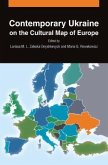This book examines why, when the conflict in eastern Ukraine began in 2014, fighting broke out in the Donets'k region, whereas it did not in Kharkiv city, despite the city, like the Donets'k region, being geographically proximate to Russia and similar in ethnic and linguistic make up. Based on extensive original research, the book argues that a key factor was the nature and behaviour of local elites, with those in Kharkiv having diffuse ties to the centre and therefore being more capable of adapting to sudden, profound regime change at the centre, whereas the elites in the Donets'k region had much more concentrated ties to the centre, were dependent on one network, and therefore were much less able to cope with change. The book thereby demonstrates how crucial for Ukraine are patronal politics, patronage networks, and informal centre-region relations, and that it was these local political circumstances, rather than Russia, which brought about the conflict.
Hinweis: Dieser Artikel kann nur an eine deutsche Lieferadresse ausgeliefert werden.
Hinweis: Dieser Artikel kann nur an eine deutsche Lieferadresse ausgeliefert werden.








